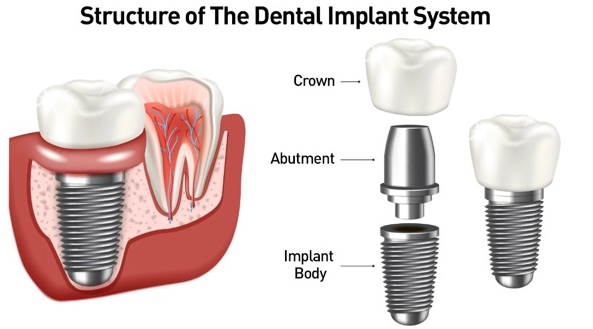Dental implants are medical devices surgically implanted into the jaw to restore a person's ability to chew or their appearance. They provide support for artificial (fake) teeth, such as crowns, bridges, or dentures.
Background
When a tooth is lost due to injury or disease, a person can experience complications such as rapid bone loss, defective speech, or changes to chewing patterns that result in discomfort. Replacing a lost tooth with a dental implant can significantly improve the patient's quality of life and health.
Dental implant systems consist of a dental implant body and dental implant abutment and may also include an abutment fixation screw. The dental implant body is surgically inserted in the jawbone in place of the tooth's root. The dental implant abutment is usually attached to the implant body by the abutment fixation screw and extends through gums into the mouth to support the attached artificial teeth.

Recommendations for Patients
Before choosing dental implants, talk to your dental provider about the potential benefits and risks, and whether you are a candidate for the procedure.
Things to consider:
● Your overall health is an important factor in determining whether you are a good candidate for dental implants, how long it will take to heal, and how long the implant may stay in place.
● Ask your dental provider what brand and model of dental implant system is being used and keep this information for your records.
● Smoking may affect the healing process and decrease the long-term success of the implant.
● The healing process for the implant body may take several months or longer, during which time you typically have a temporary abutment in place of the tooth.
After the dental implant procedure:
♦ Carefully follow the oral hygiene instructions given to you by your dental provider. Regularly cleaning the implant and surrounding teeth is very important for long-term success of the implant.
♦ Schedule regular visits with your dental provider.
♦ If your implant feels loose or painful, tell your dental provider right away.
Benefits and Risks
Dental implants can significantly improve the quality of life and the health of a person who needs them. However, complications may sometimes occur. Complications can occur soon after dental implant placement or much later. Some complications result in implant failure (usually defined as implant looseness or loss). Implant failure can result in the need for another surgical procedure to fix or replace the implant system.
Benefits of Dental Implant Systems:
◆ Restores the ability to chew
◆ Restores cosmetic appearance
◆ Helps keep the jawbone from shrinking due to bone loss
◆ Preserves the health of the surrounding bone and gums
◆ Helps keep adjacent (nearby) teeth stable
◆ Improves quality of life
Post time: Oct-22-2022
